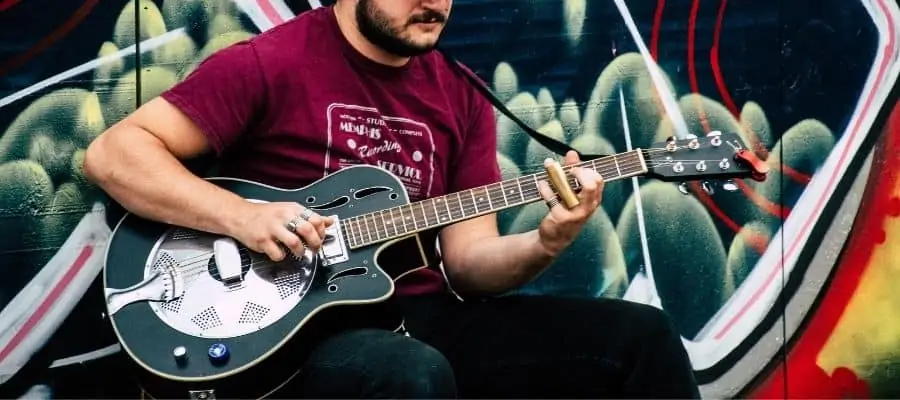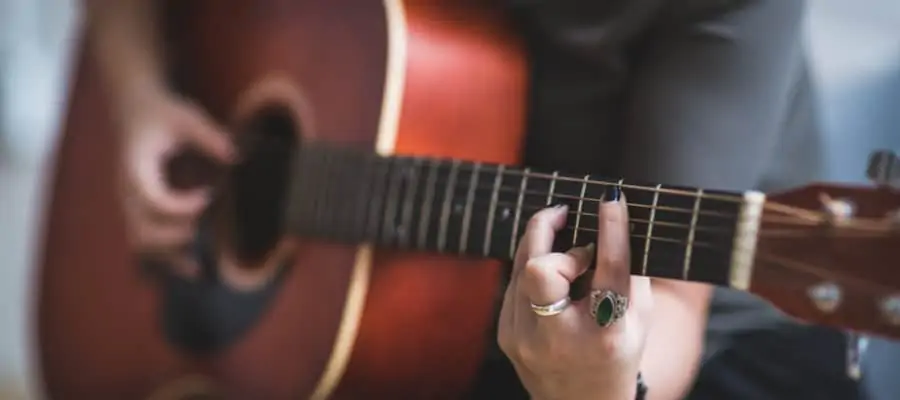The most common question every person asks when stepping into the world of guitar is how long does it take to learn how to play guitar? The answer is simple.
It can take you a couple of months to get to know the instrument and play a few songs you love. But to really master guitar can take years of practice as any other musical instrument. It depends on the type of person you are and your practicing habits and the goals you set for yourself.
At the end of the day, the most important is to practice guitar on a daily basis. Sure, having a talent and sense for music is a big help, but practice and the quality of the practice are what make it different.
The guitarist that practices in the correct way will outrun lazier yet more talented guitarist by a long shot. Let’s see what else is there when it comes to getting good at guitar.
How Many Hours a Day Should You Practice Guitar?

First, let’s understand what does practicing exactly means. Taking your guitar and doodling around can be considered as practicing but what practicing should represent is being focused while practicing and trying to work on exercises, techniques, memorizing parts, and working on drills and patterns.
While practicing, it is important to maintain focus. Practicing guitar for too long is not effective as practicing in short sessions of 10-15 minutes.
If you want to practice for longer, hours or more, it’s best to split up the time with regular breaks for best results. Long sessions without breaks may feel like they work, which they do, but not they are not effective as sessions with regular breaks.
The time you are willing to invest in practicing guitar is determined by your goals. If you want to play guitar professionally you will have to sacrifice a lot more time than a person who wants to play guitar as a hobby. Getting to the professional level of playing will take you a lot more dedication and practicing guitar than learning guitar to play for your friends or family.
How Many Hours Do Professional Guitarists Practice?
Professional guitarists on average practice between four to eight hours. This includes rehearsals and performances. The genre of music they play takes a big role in professional guitarists’ practice. It will determine how much time is spent daily on practicing guitar, and what type of practice will the guitarist use during this time.
One of the most famous guitarists in the world is Slash claims that he was practicing 12 hours a day. This does not have to mean that you have to practice 12 hours a day to get to the Slash level of playing. It is important to keep in mind that not everyone learns at the same pace.
Is it Difficult To Learn Guitar?

The difficulty of learning guitar depends on what kind of person you are. For most people guitar will be hard to learn in the beginning, but as time goes by it will be easier and easier and you will learn new things relatively quickly.
The more you practice, the more easy the guitar will be. This is the main reason why people who are just starting to learn guitar tend to quit within a month.
The most important thing to remember when starting to learn guitar is that every beginning is hard. If you manage to overcome the first 6 months of learning, you will notice that things start to get easier and you will feel more confident in your guitar playing skills. Playing it on almost a daily basis is crucial. Make sure to grab your guitar anytime you can.
Being talented and having natural abilities for guitar is a plus but practice and persistence are far more important for great results. There are dozens of guitarists who are far more talented but their lack of dedication and regular practicing made them incompetent to the ones who are persistent and practice regularly.
Can I Learn Guitar In a Month?

Even though you will most likely get to understand the basics of guitar and maybe learn enough guitar chords to play a few songs within a month, you still have a long way in front of you. It will take time for your fingers to develop enough callus on their tips and it will feel much easier to play as time goes by.
The first month of learning how to play should be spent learning basic guitar chords and scales. The next step is to learn songs that fit in those songs. The best practice is to learn what lies behind the song, which scales does it come from? Which type of chord progression does it have? It is important to have an understanding of what lies under that song, not to just understand the song you are learning.
The truth is that you will never fully master guitar. That is what is beautiful about guitar and music in general. You will never learn everything and there is always room to improve and learn more.
Is it Hard to Teach Yourself Guitar?

Most guitarists today have thought themselves how to play guitar thanks to the internet. It sure is easier to have a guitar teacher who can guide you in the right direction, but the internet is also a great place to start.
By simply typing “How to play guitar” in the search engine, you will get millions of results for guitar-playing guides. One thing to keep in mind is to do the right research on which guitar guide to follow.
By having more than millions of options, not all of them are right for you. The best place to start is YouTube since it offers a lot of free guides which you can filter simply by the number of views. One with the most views is most likely the best one.
The good practice is to not limit yourself on YouTube only. Research articles and online tutorials also, if you are willing to spend a few bucks on private classes, there are many online guitar tutors which provide great value to the price.
The best guitar player is not necessarily the best teacher. Playing guitar is one thing, but teaching someone how to is a different set of shoes. A good teacher will understand your struggles and break them down for you into simpler steps.
He will make sure that he adjusts the pace of learning to your capabilities. Learning how to play guitar may be easier by yourself than having a bad teacher teaching you.
The best advice for learning guitar yourself is to take it slow and choose the correct learning material. If you are not too sure about something, ask for advice from someone familiar with the matter.
How Long Does It Take The Average Person To Learn Guitar?

Like most of the things when it comes to guitar, this also depends on the type of person you are. People who tend to practice 3-5 times a week for half an hour a day will in the period of one to two months learn how to play basic guitar chords and a couple of beginner guitar songs. After three to six months of playing, the average person will be able to confidently play intermediate songs with more difficult technical elements.
In the process of learning guitar, you will most likely stumble upon the “10000 hours rule”. What this rule means is that it will take you 10000 hours to get to the professional level of mastering one skill. While this may be useful to create your plans according to it, this number is completely debatable because not every person is the same and not everyone learns at the same pace.
During these 10000 hours, you will go through multiple phases and levels of playing guitar. These stages are a great way to identify your guitar-playing skills and learn things that come within those stages. As time goes by, you will be able to identify yourself and the level of your guitar playing skills.
The Stages of Learning How to Play Guitar
The first stage every guitarist, including professionals, has to go through is the beginner stage. In this stage, you will learn basic guitar chords and rhythmic strumming. This stage can also include basic fingerpicking. You will be in this stage for about the first 1-2 months.
The next stage is the intermediate level. In this stage, you will be confident with playing arpeggios, a basic understanding of scales such as pentatonic scale. Most people in this stage will be able to improvise over easy chord progressions, be comfortable with the hammer-on, and pull-offs as well as thrills.
Guitarists tend to learn to ready tablatures in this stage which can help you learn new songs much faster. Most people will be in this stage between their third and sixth months of playing.
The intermediate-advanced level of playing guitar comes as the next stage. By this time, playing basic guitar chords will be a piece of cake for you. This stage will introduce you to barre chords and quick change of finger positions. You will feel comfortable playing almost every beginner-intermediate guitar song. You will be in this stage in your 12th to 18th month of playing.
The advanced level is the next stage. Now, you will have your music theory down. You will be able to play almost everything you want and you will feel comfortable improvising over almost every chord progression. Learning songs by ear should not be a problem for you. This stage comes within 18 to 36 months of playing guitar.
An important thing to remember is that you may go through some stages quickly and get stuck in others. It all depends from person to person so do not be harsh to yourself if things do not go as planned.
Is It Too Late To Learn How To Play Guitar?

It is never too late to learn how to play guitar. Whether you are 7 or 77 years old, it is never too late or too early to learn guitar. Sure, starting early will give you the advantage of learning faster than someone who starts late in their life, but you are still capable of learning how to play if you are older.
It is considered that your brain is not fully developed until the age of 25. So if you are under 25 and wondering if is it too late for you to learn guitar, think again. It is a prime time for one person to learn a new skill in life. Learning guitar will be much easier for you than for someone who is 40 or over.
Learning guitar later in life has some advantages over learning guitar in your twenties or younger. The most notable advantage would be the fact that you will have more time to practice, especially if you’re retired. Learning guitar can be a fantastic way to keep your brain healthy and occupied.
What’s The Best Guitar To Start With?

Choosing your first guitar is an important step in learning the art of playing guitar and it can determine how fast you will learn. It all comes down to each person and it is not go the same for everyone. Having good beginner guitar is crucial.
The first thing that determines which guitar is for you is the size of it. Most guitarists will start with a steel-stringed acoustic guitar. This will save you the trouble of buying an amplifier for electric guitar. The usual size for most people is 4/4 guitar, but going down to the nearest guitar shop and asking for advice from employees is always a good practice.
Sure, there are many great budget-friendly options for beginner electric guitar starter kits, but most people will go with a classical flamenco style guitar or steel-stringed guitar since they sell for a much lower price.
On the other hand, electric guitars usually have lower action than acoustic guitars which can save you from a lot of pain in the beginning. The electric guitar also comes with the advantage of using earphones to practice. This is great for people who live in a noise-sensitive neighborhood. Practicing with earphones will contain the noise within your room and keep your neighbors happy.
Buying your first guitar is also determined by what type of music would you like to play. If you want to play rock, get yourself an electric guitar. If you want to play folk or fingerstyle, the best starting point is the steel-string acoustic guitar. If you like flamenco style or classical music, buy yourself a nylon string classical guitar.
What Is The Easiest Song To Learn On Guitar?

You have learned a couple of basic guitar chords, now you will like to learn a song. Where should you start? It is usually recommended to start with something you are familiar with and something you love to listen to. Try to learn popular songs since you will have a lot of video tutorials on how to play them. You can consider learning some of these:
- The Lazy Song – Bruno Mars
- Wake Me Up – Avicii
- Smells Like Teen Spirit – Nirvana
- Losing My Religion – R.E.M.
- Back In Black – AC/DC
- Africa – Toto
- Stand By Me – Ben E. King
- Take Me Home, Country Roads – John Denver
There are a lot of iconic songs from which you can find a lot of material to learn online. These are just some of the most popular picks from different genres. You should always try to learn from the songs you practice and implement that knowledge to other songs. You can find more suggestions for what songs to learn to play here.
While searching for material online, you will most likely come across guitar licks tutorials. Guitar licks can be great to learn how to improvise over your favorite songs.
Conclusion
The world of learning how to play guitar and music, in general, is a big one. You will always discover that there is always something new to learn and you should never stop learning. The time in which you acquire knowledge depends on you and your practicing habits and your dedication to learning how to play guitar.
Practicing daily and researching can get you far from your bedroom. Being talented will help you, but regular practice and dedication will get you further. Remember, practice makes it perfect.
If you found this article useful, you may want to save this pin below to your Guitar board.

Recent Posts
When learning new songs have you noticed that some of the chord sequences sound really good? But when you tried to come up with your own chord sequence, or as we call it chord progression, you found...
Some guitarists insist on buying an expensive amplifier with their electric guitar. They assume that this is a must for every type of guitarist out there. However, in some situations, this isn’t...

